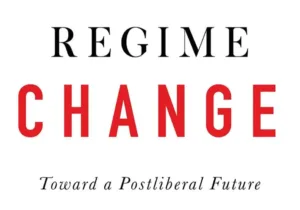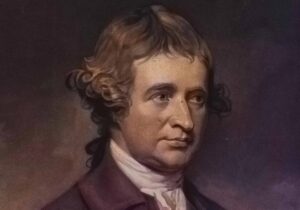Eric Nelson of Harvard University discusses with Mark Tooley his book The Theology of Liberalism: Political Philosophy and the Justice of God, in which he connects liberalism’s origins to Christian debates over Augustine, Pelagius, Arminianism, human nature, salvation and government. (See Daniel Strand’s earlier review.)
Tooley: Hello this is Mark Tooley, editor of Providence: A Journal of Christianity & American Foreign Policy, with the pleasure today of speaking with the author of The Theology of Liberalism: Political Philosophy and the Justice of God, who is Eric Nelson, professor of government at Harvard University. Providence reviewed his fascinating book a few months ago in an article by Daniel Strand, which I commend to you, but we appreciate the opportunity to go to the author himself for further explanation and analysis. So, Dr. Nelson, thank you.
Nelson: Thank you for having me. It’s a pleasure.
Tooley: So, in summation, what is your book about?
Nelson: Well, my book is really trying to look at the ways, often the sort of unrecognized ways, in which what presents itself as sort of robustly secular contemporary liberal political philosophy is in extremely sort of deep and complicated ways entangled in theological debates. And so, in essence, the book is trying to lay all of that out and really tell the story of how liberal political philosophy, in the Anglosphere in particular, although increasingly in Europe, but certainly political philosophy in the wake of John Rawls, took a very noticeable turn. Which, in retrospect, becomes clear once we understand Rawls’s own religious formation. So, I really begin there and then try to look at different strands of contemporary liberal and egalitarian political philosophy and scrutinize them for how they either sort of surreptitiously make use of what began life as religious or theological premises or are sort of unselfconsciously rehashing, as it were, theological debates in drag. That is, debates that had already been had before for centuries in an incredibly high level of sophistication but in a slightly different guise. And so, anyway, that’s the general thought.
Tooley: How do you define liberalism, and how does this history intersect with the history of Christianity?
Nelson: Well, of course, that’s the big problem, because the term liberalism as applied to any system before the early 19th century is an anacronym. Liberalism as an ism, the term liberalism, is a product of the decade following the French Revolution in France and debates about the French Revolution. And so, whenever we use it in relation to earlier periods and earlier theorists, we’re engaging in a kind of anachronism, or it’s a kind of sleight of hand about which we have to be careful. On the other hand, of course, the kind of distinctive constellation of institutional commitments that we associate with liberalism, things like religious toleration, freedom of speech, some sort of doctrine of the importance of privacy and its protection, government by consent, the whole set of sorts of commitments that we identify as liberal, did have their origins in the early modern period. So, we sort of inevitably look back to the 17th and 18th centuries to look for the antecedents of this cluster of commitments, and that’s not stupid. That makes a great deal of sense. That’s where they come from, but they weren’t cold liberal, and they were all show. And here’s where it gets very tricky. The same basic let’s say political commitments, things like religious toleration, for instance, were often defended on very different grounds. And so, really what we’re talking about is a set of liberalisms, a set of very different traditions of thought that sort of deliver this overlapping consensus in favor of this recognizable set of institutions. So, what I mean by liberalism and the thing that I’m really interested in thinking about in this book is not just that set of commitments, but one kind of rationale for them, namely the kind that derives them from a fundamental commitment to the autonomy of individuals as choosers. And so, a view that places extreme importance on the protection of voluntary action, and then, as it were, reasons from that to this set of commitments. And I call it, maybe a bit clunkily, “dignitarian.” That is the idea that sort of positions commitments like religious tolerance, free speech, the prevention of coercion in relation to private behavior and selling, that these things should be understood as implications of the correct understanding of persons as possessing dignity. Where dignity is understood as something like the capacity for morality, the ability to choose. And that’s really the line that I’m looking at. So, it’s very important to say there are other ways of getting to liberal commitments. For instance, let’s take a very obvious one, you could get to liberal commitments because you’re a utilitarian, right. You could just think look, what I’m interested in is maximizing wellbeing. And oh, by the way, I make the empirical claim that the way to maximize wellbeing is to sort of protect people’s rights in this broadly liberal way. That would get you a defense of the same cluster of commitments but via a very different route. So, this is not the only route, but obviously it’s an extremely important one. And it’s the one that the philosophers in the contemporary period, the sort of second half of the 20th century into the early 21st, whom I’m looking at, take themselves to be endorsing. That’s to say the people I’m looking at are dignitarians. They’re not utilitarians. They’re not any number of other kinds of things. And so, that’s the tradition that I’m looking at, so I’m really trying in the first part of the book to think about where this thing called dignitarian liberalism comes from. I make the case, as you know, that this is really a position that begins as a theodicy and then I sort of go from there.
Tooley: And you draw into your genealogy of liberalism several categories from Christian history, Pelagianism, Augustinianism, Calvinism, and Arminianism, related to the political struggles in Britain in the 1600s between the Calvinist Parliament and the more Arminian Royalists. So, how did all that play out?
Nelson: Well, in essence, again, I should just say these are all very problematic categories, and so, I tried to be very careful about how I use them. Pelagianism, in particular, is a very tricky one because Pelagian is a term of abuse in the early modern period. No one says, “Hello, my name is John and I’m a Pelagian.” It’s what you call someone you don’t like. So, first of all, that’s a challenge, and it’s also a challenge because Pelagianism takes its name from a particular figure. As many of your viewers will know, that is this sort of late fourth, early fifth century British kind of lay monk named Pelagius, who was then attacked by Augustine in a series of late polemical theological works. And about Pelagius himself we know relatively little, and figures in the medieval and early modern periods knew even less. They possessed virtually no texts by Pelagius, so they knew him, as it were, through the bits that Augustine quotes and then attacks. And so, Pelagianism as an ism bears a complex relation to the actual figure of Pelagius, about whom we now know a bit more because various texts by Pelagius have been identified and studied in the last hundred years or so. But basically, the debate is classic and pretty simple. It’s that basically if you begin by thinking that if you’re what philosophers call a rationalist about morality, that’s to say you think that morality or moral principles just exist necessarily and they’re not the result of God’s willing them to exist, God being perfect simply conforms himself always to these free-standing principles. So, the other view, which we know as voluntourism, is the view that says no, it’s God who makes these principles. God sets the rules. And for any number of reasons, that was taken to be a very unattractive view for orthodox theology. So, the overwhelming majority of Christian theologians, as Jewish theologians, Muslim theologians, were rationalists. So, they would say yes, moral principles just exist and God is perfect, and so he unvaryingly conforms his behavior to them. But wait, if all of God’s behavior, if he is indeed omnibenevolent, perfectly just, and so on, how do we account for the fact that there’s so much evil in the world and suffering? And that issue becomes the debate known as the theodicy debate, although that’s a term invented by Leibniz, coined by Leibniz in 1710. It’s a debate that had been going on for a millennium and a half at that point, at least. And this is the attempt to try to explain how the evil or badness that exists in the world of different kinds is compatible with the hypothesis that an omnipotent and perfectly just God could have elected to create this world. And one of the kinds of badness which was most worrisome was the evil of punishment for sin. That’s to say, if you were an orthodox Christian, you believed that, particularly in the earlier period, you believed that the vast majority of the human race was going to be damned, and you needed to explain why God’s justice was compatible with that fact. And so, the most natural line of response, which is the one that Pelagius himself took, is to say well, easy, it’s because we’re free. We’re capable of morality. We’re always capable of not sinning, of choosing not to sin, and, therefore, if we do sin, God is just in punishing us. So, fair enough. And then you could use that same argument to address a different but related worry, which is how might you explain the fact of physical suffering in the world? Why is this a world that has earthquakes and cancer and all of these things? Well, you might say that the thing that’s transcendently valuable is that there should be creatures like us who are capable of morality, of free choice. And perhaps we can imagine, although we could never prove, that in order for there to be creatures like us who are capable of morality, you need this complex recipe of natural forces and elements, one of the byproducts of which is going to be things like earthquakes and cancer. And that the badness of those things is outweighed by the transcendent value of our morality, of our capacity for morality. And that’s basically Pelagianism. The problem for Augustine, which is why he attacks Pelagius, is that this seemed to him, and to many who followed him, to possibly help you in the theodicy debate but to be very, very dangerously incompatible with Christian doctrine. Because if we’re all perfectly capable of choosing not to sin and thereby electing and meriting God’s favor and election or salvation, why did we need Jesus to come and be crucified? Why did we need the atonement? What’s the role of grace, doesn’t that all just collapse? And so, Augustine responds by doubling down on his sort of massively important formulation of the doctrine of original sin, which says that we’re not free not to sin, that we’re actually in bondage. The spirit is depraved and incapable of avoiding sin, and therefore the only thing that saves us is unmerited, irresistible grace. Which is the position he takes until the very end of his life. In the subsequent history of Christianity, this has been a dialectic, right. So, most Christian theologians try to come down somewhere in the middle. I mean, you had Calvinists and Jansenists who went the full way of Augustine and the full predestinarian salvation story and damnation story, but most tried to do something in the middle. Grace is necessary but not sufficient, or that we can make ourselves somehow open to grace, we can at least accept it or reject it. We have some role in it and so on. But the orthodox position, the one that really comes out of Augustine, must assign a very large role to grace. And this seemed to many of the figures that I’m talking about in the book to turn God into a kind of tyrant, and therefore to be absolutely unacceptable. That’s to say, if God first depraves your spirit so that you can’t sin and then punishes you for the sin you couldn’t avoid, that’s the behavior of the tyrant. And so, they were, the figures I’m interested in, this kind of long train from Milton through Locke, Kant, and so on, were all becoming increasingly Pelagian, rejecting the doctrine of original sin, being led to very heterodox views about things like the Trinity or the divinity of Christ. They were becoming something very much like later sort of what we would know in the later period as unitarians. They were kind of getting very, very far away so that they could defend the justice of God. And what I try to show is that all of these commitments to religious freedom, toleration, the sort of respective political institutions for individual choice, they all justified on the model of that theodicy, and as a result of it. Because if the thing that’s transcendently valuable is that we have to be capable of morality, and if being capable of morality means being capable of freely choosing to do the right thing, then we have to be, as it were, let alone to make choices, including bad choices. And that’s the sort of view that I take to be distinctive of dignitarian liberalism really until Rawls. And my story is really about how Rawls turns all of this upside down, because Rawls really, as we now know, although we didn’t for quite some time, or very few people did, Rawls began his intellectual life as a very committed Christian who was studying theology and who was planning to become an Episcopal priest. And his formation was deeply, deeply Augustinian and very anti-Pelagian. So, he was completely opposed to the idea of the possibility of merit for human beings, of earning, and I tried to show how those commitments remain with him even later in life when he’s writing what purports to be secular political philosophy. So, that’s the short version, or as short as I could make it,
Tooley: And so, in the next minute or two as we conclude, where are we today in terms of liberalism?
Nelson: Well, I think we’re very confused, because it’s increasingly common, at least in my neck of the woods, for people who think of themselves as liberal and as egalitarian indeed to be most skeptical of the idea of merit, or desert or earning. So, we see all of these attacks on the idea of meritocracy. And one of the things I’m trying to point out is that’s a very strange view to find in an egalitarian theory, because the whole point is to say, I mean, what all these Pelagians were saying was look, if God is just and he’s going to judge us, then it means we all have to be not just capable, but equally capable, of autonomous choice, and shaping our moral lives, and making good decisions, and being disciplined, and being industrious, and cultivating virtues. We have to all have the ability to achieve and to be meritorious. And the opposing view which says well no, all these facts about us, the facts that cause some people to be better at leading human life than others or to make better decisions than others, to be more moral than others, to be more productive than others, all of that is just as the cards were dealt, some combination of heredity and environment over which we have no control. That looks like a very inegalitarian theory, right, because that’s a kind of natural caste system that says that there are some human beings who, instead of because of God’s favor, because this has now been secularized, we’ll call it just chance or the natural lottery, were just given better natural endowments, a better character, a better disposition. And everyone who does less well couldn’t have but done less well, right. And so, you have sort of the elect and the reprobate, but just in this secularized form where they’re called the better endowed and the worst endowed. Or the fortunate or the naturally unfortunate. And that to me seems like a very odd view to find at the center of liberal egalitarian theory. So, that’s my thought.
Tooley: If I understand you correctly, in your book you’re suggesting that liberals to become better liberals tend to become better Pelagians?
Nelson: Yeah, that’s about it in a nutshell.
Tooley: Eric Nelson, author of The Theology of Liberalism: Political Philosophy and the Justice of God, thank you for a fascinating conversation.
Nelson: Thank you, Mark. I appreciate it.







 Sponsor a student for Christianity & National Security 2024
Sponsor a student for Christianity & National Security 2024